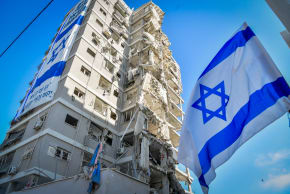Haredi
Why Jerusalem’s last-place quality of life ranking doesn’t tell the full story - opinion
A new quality of life report puts Jerusalem last, yet cranes, jobs, housing, and transit projects point to a great future.


The IDF’s haredi pivot: From integration to accommodation - analysis

WATCH: Haredim block roads near Tel Hashomer in protest of IDF draft, deemed unlawful by police

Israelis divided on joining US pre-emptive strike on Iran, ending US military aid - IDI poll
The haredim do not have a credible argument for avoiding IDF service - opinion
Israel cannot sustain a system where one segment of society fights, pays taxes, and bleeds, while another group is draining the societys resorces without contributing in return.

A-G Baharav-Miara says gov’t is violating ruling on haredi conscription as enforcement plan stalls
Attorney-General Gali Baharav-Miara's comments at the High Court of Justice came as the government has failed to adopt effective measures for the conscription of ultra-Orthodox yeshiva students.

Police called to extract haredi soldier from Jerusalem anti-draft protest
According to Israel Police, the IDF soldier was caught up in one of the haredi anti-drafting protests in Jerusalem, and was surrounded and attacked by "400 extremist protesters."

Haredi enlistment on the rise, still falling short of IDF goals - N12
The increase over the past two years has been attributed by professional sources to the repercussions imposed on those who don’t enlist.

Millions of Israelis, including 900,000 children, live in poverty, NII report for 2024 shows
Poverty rates remain especially high among Arab and haredi populations, who together account for 65.1% of people in poverty, nearly double their share of the population.

Outcome of state budget vote uncertain amid coalition crisis over haredi draft
By law, if the state budget is not approved in all three readings by the end of March, when the fiscal year closes, the Knesset will automatically dissolve, and elections will be called.

2026 budget reading puts government at risk, after months of ideological sparring - analysis
If the vote is postponed, or if the haredi (ultra-Orthodox) parties choose not to support it and it falls, then for all intents and purposes the government will fall with it.

Haredim in Israel’s periphery show distinct lifestyle gaps from center, Shoresh Institute finds
The research studies how the accelerating migration of haredi households out of central Israel intersects with transportation, spending patterns, and fertility decisions.

IDF chief promotes Hashmonaim Brigade commander to chief adviser on ultra-Orthodox issues
Part of the new position will involve some of the same responsibilities Emunah has had in founding the brigade, specifically tailored to haredim, but his portfolio will likely be widened.

Jerusalem daycare tragedy: When ideology blocks oversight, babies pay the price - opinion
Two infants died in an unregulated Jerusalem daycare, exposing failed law enforcement, budget cuts, and deep cultural divides over accountability and prevention.
